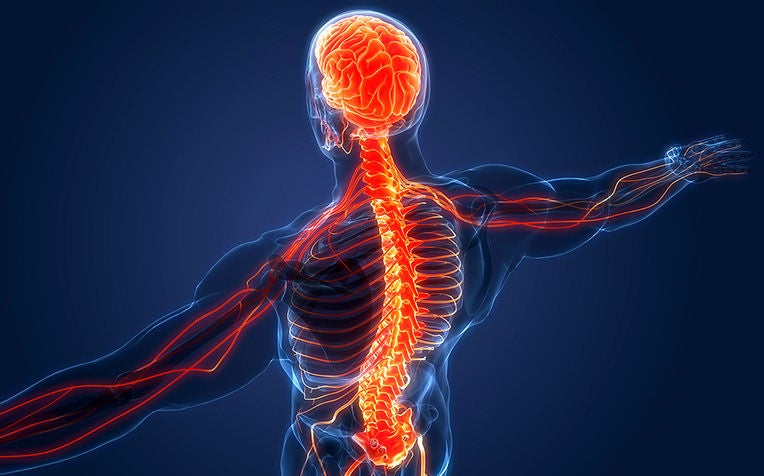
The nervous system is made up of the central nervous system (consisting of the brain and spinal cord) and peripheral nervous system (the network of nerves that runs throughout the body).
Did you know? Every thing your body does is connected in some way to your nerves and nervous system.
From controlling complicated processes like movement, thought and memory, to telling your heart to beat and your lungs to breathe, your nervous system controls it all - very often, at times when you don't even think about it.
The body's nervous system is divided into two parts:
The central nervous system, which consists of the brain and spinal cord, and
The peripheral nervous system, which consists of the rest of the nerves throughout the body
It uses specialised cells called neurons to send signals, or messages, all over the body. These electrical signals travel between your brain, skin, organs, glands and muscles.
If fact, some of these signals can travel as fast as over 240km/hr! Take for example, when your hand accidentally touches something hot and you go "ouch" while pulling your hand away.
5 Easy ways to care for your nerves and nervous system
As your nervous system plays a wide variety of vital roles, it is important to keep them functioning well into your golden years.
"Peripheral neuropathy or the damage of the nervous system is often caused by poorly-controlled Type 2 Diabetes (diabetes mellitus) and chronic kidney disease," explains Dr Koh Yeow Hoay, Head of Neurology at Changi General Hospital (CGH), and a Consultant at the Department of Neurology at National Neuroscience Institute (NNI). Both CGH and NNI are members of the SingHealth group.
To keep your nervous system healthy, Advanced Practice Nurse (APN) Fam Su Rong from the Department of Nursing at NNI offers five simple tips.
 1. Adopt a healthy diet
1. Adopt a healthy diet
A well-balanced diet helps support a healthy nervous system. A good option is the Mediterranean diet, which consists of:
Whole grains
Vegetables
Nuts
Fruits
Fish
Seeds
Adequate Vitamin B12 is needed for nerves to function properly. Examples of foods rich in Vitamin B12:
Eggs
Lean red meat
Fortified breakfast cereals
Dairy products (e.g. milk, cheese, yogurt)
Fish and shellfish (e.g. salmon, tuna, clams)
 2. Control alcohol intake and stop smoking (if you haven't)
2. Control alcohol intake and stop smoking (if you haven't)
Excess alcohol and smoking can damage nerves and harm many other parts of the body.
 3. Exercise regularly
3. Exercise regularly
Exercise encourages nerve regeneration. If you are able to, aim to have 150 minutes of physical activity a week. If this is not possible, passive forms of exercise where a caregiver helps to move your limbs can improve muscle strength and prevent muscle wasting in paralysed limbs.
 4. If you are diabetic, keep your diabetes under control
4. If you are diabetic, keep your diabetes under control
Diabetes is the leading cause of peripheral neuropathy in Singapore, affecting around one in three people with diabetes. It is important to manage blood glucose levels through exercise, diet and medication. Uncontrolled high blood sugar damages nerves, and can lead to foot ulcers. If not caught and treated early, foot ulcers may become infected and require toe or foot amputation in severe cases.
People with diabetes should take special care of their feet – look out for any blisters, sores or cuts and get them treated immediately. A podiatrist is also important in the prevention and management of peripheral neuropathy as they can advise on appropriate footwear and foot care, remove calluses and manage foot problems such as ulcers.
For tips on diabetes foot care, check out this article here.
 5. Get your medication checked
5. Get your medication checked
Some medications can also cause neuropathy, such as certain seizure medication and chemotherapy drugs. Review your medications with your doctor to see if there is a need to change out those that can cause or worsen neuropathy.
Why do I feel a tingling, burning pain or numbness in my feet and legs?
"When nerves in the peripheral nervous system become damaged, it can lead to various odd sensations in the body. This is known as peripheral neuropathy, a common neurological condition that affects roughly one in three people aged 80 and above worldwide," explains Dr Koh.
To learn more about the common causes and symptoms of peripheral neuropathy, click here.
Ref: J22
Check out other articles on nerves:
Sensory Peripheral Neuropathy: Causes, Symptoms and Treatments
Chronic Pain: Nerve Pain is a Common Cause
How Diabetes Affects the Kidney, Nerves, Heart and Blood Vessels
Contributed by














 Get it on Google Play
Get it on Google Play